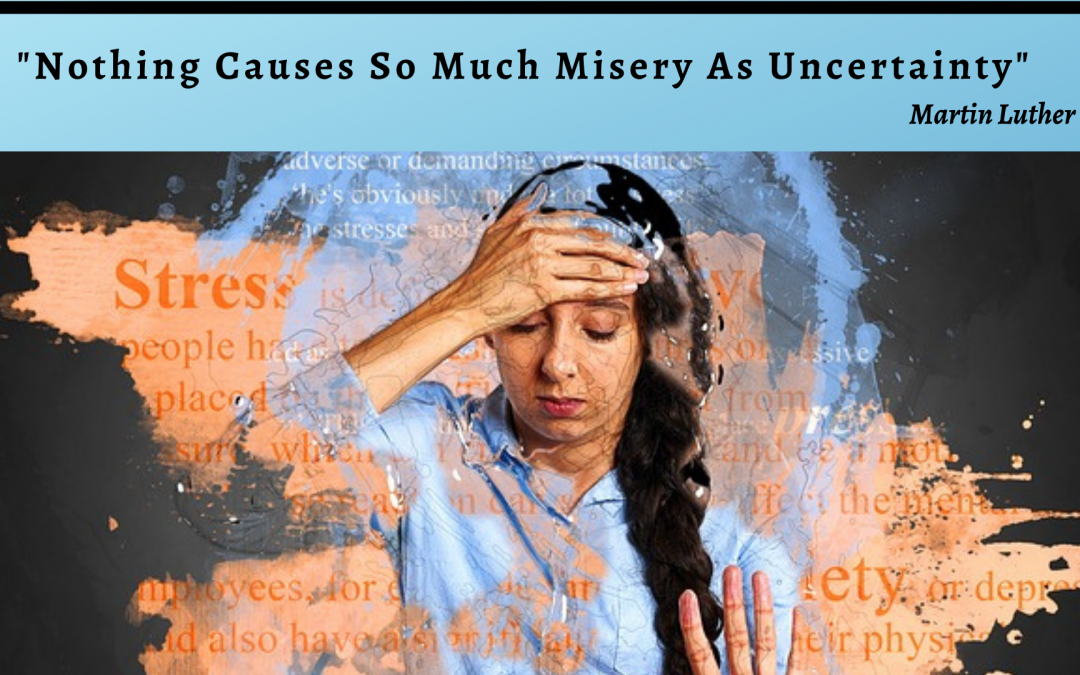In just a few months, the novel coronavirus disease (COVID-19) has brought the human world to a standstill. The global landscape has changed from a busy market society to the shut down of businesses and schools. Billions across the world are confined to their homes, with little or no social contact with loved ones and friends. No one knows how things will ultimately play out and how serious this virus is and how many people will be affected by it, as well as; how this virus and the economic shutdown will shape the future of society, governments, healthcare, schooling, work life and more. There is no way to predict even small things such as if we will still be able to find our favorite foods in the grocery store or if hugging our friends will become a thing of the past. To make matters worse, there is now a deepening divide and growing polarization in US politics, society and culture, spurred on by news media and other ‘opportunists’ that want to use this crises as a way of pushing their own agenda. The uncertainty that each one of us is facing is impacting our brains, our minds and our hearts in such a way that we are likely to experience increased moments of fear, stress, anxiety, depression and / or despair. All this can make it very difficult for many people to get through each day and even focus on small things such as getting out of bed or cooking a meal. For us to be able to cope better with the situation and develop some resilience, we must start with gaining a deeper understanding of how uncertainty can impact our physical brain and mind.
Martin Luther (a Christian theologian and Augustinian monk) once said “Nothing in the world causes so much misery as uncertainty”. In fact, a group of researchers from the Institute of Neurology at University College London showed this to be true in one of the most sophisticated experiments carried out on how our brains handle high levels of uncertainty. The researchers used a computer game in which volunteers had to overturn digital rocks that may or may not have snakes hiding underneath them. If a snake appeared, the volunteer received a mild, but painful electric shock on the hand. As the game progressed, volunteers were motivated to learn the habits of the snakes, so they could get better at guessing which rocks hid the snakes.
Behind the scenes however, the experiment was designed to measure stress levels by monitoring several physiological functions (associated with the stress response) such as pupil dilation and perspiration in connection with a high level of uncertainty. This meant that the game was designed to maintain a high level of ongoing uncertainty, by continually reducing the odds of success for the volunteers.
What the study showed with great precision was the relationship between stress and uncertainty. Volunteers experienced the highest levels of stress when they faced the highest level of uncertainty. That is, when predictability was at 50%, which meant they did not know if they were going to receive a shock or not. In other words, the stress experienced by volunteers was higher if they did not know if a snake was hiding or not under a rock than if they were sure that a snake was or was not there. Thus, uncertainty is more stressful than any predictable consequence, including a negative one.
So, how can we use this information to understand people’s behavior in the current situation. We know that there is a tiny part of our brain called the amygdala that is pre-wired to constantly screen for any potential signs of threat or danger to our well-being. It seems uncertainty is perceived by our internal systems as a significant threat, which immediately triggers the sympathetic nervous system into a state of fight or flight. In the face of our current situation where our basic needs such as our livelihoods, our food supplies our health and our potential survival are at risk, our internal systems have gone into a collective overdrive of fight or flight.
What most people don’t realize is that this prehistoric part of our internal systems has the ability to put us in a state of reaction, eliciting a chain of deeply ingrained responses; especially in the face of our current crises and often without our awareness or realization of what we are doing. These responses or reactions aren’t just physical. They are also emotional and psychological. Logic is replaced by fear and our behavior becomes driven by anxiety and worry, as we prepare to either run or fight.
Whilst the prehistoric part of our internal systems might have worked great hundreds of years ago, when there were real external dangers we needed to fight or flight, such as a tiger; in today’s world, many of the dangers we face are internal and perceived. Unfortunately, when we are confronted with a threat like the coronavirus pandemic, this prehistoric part of our internal systems does not serve us well. It is true that all of the uncertainties surrounding the pandemic could threaten many aspects of our well-being, but being triggered into an overly fight or flight response only leaves us with a lot of reactive energy that cannot be dispelled easily, especially since we are now also physically confined to our homes and there is no obvious enemy we can fight or flee from.
This is where the problem begins. When fear sets in, our internal systems will do whatever it takes to regain a state of balance and control. In an attempt to find homeostasis, our minds can create all kinds of stories to find outlets to release the built-up energy. The hoarding of water and toilet paper are good examples of irrational fear-based behavior, where those who engaged in it were able to dispel some of the fight or flight energy that had built up inside them, somehow temporarily warding off the perceived danger. The denial that the coronavirus might be real and threatening gives us permission to fight for a return to how things were, as a way of regaining control over a situation where we may have little or no control.
The problem deepens when we have many individuals with suppressed emotions and unprocessed or unhealed past traumas. Such individuals will lean towards creating stories where they are both the hero and the victim simultaneously. For such a story to succeed, there must also be something or someone to blame. This may explain why so many people in our society have turned to conspiracy theories. It is easier to dispel that built up fight or flight energy if we can blame secret governments, rich people, scientists, healthcare workers, minority groups or other nations for the coronavirus pandemic. In this process, we can declare our own superiority by showing up as the hero – the spiritual warrior, who is cloaked in love, but so ready to fight the bad guys.
One thing we can be very sure of – the uncertainties that we face today aren’t likely to go away any time soon. This makes it imperative for us to learn practices and strategies to cope better with the uncertainty, fear, anxiety, despair or whatever it is that we are facing. It also becomes imperative for us to learn a new way of thinking that would allow us to reframe the situation and develop resiliency in the face of such high uncertainty.
About The Author of this article
Her areas of expertise include Archetypal, Depth and Transpersonal Psychologies, Inner Child Work, Meditation, Subtle Energy Work and more. She has presented at many different venues, including universities and healing centers for over 15 years and is well known for being able to transform many struggles in a SINGLE session.
Meera worked as an Assistant Clinical Psychologist in the areas of Mental Health and Learning Disabilities, after finishing her postgraduate studies in Oxford (UK), but felt very discontented with the nature of conventional medicine. Her own spiritual upbringing prompted her for many years to search for tools that go beyond conventional medicine and make a bigger difference.
Through her 20 year journey, Meera began experimenting with integrating two fields she has mastered – Psychotherapy and Subtle Energy Work and this resulted in the creation of a new therapy, she calls ‘Energy – Based Psychotherapy’. Her signature programs ‘Fearlessly Authentic’ and ‘Breakthrough Anxiety’ are the culmination of Energy-Based Psychotherapy, when it is utilized in a systematic format to resolve a particular problem.
Watch Us On ABC4 – Aug 8th
We are so excited to announce that our founders, Meera Jain and Diane Cunningham have been invited to be featured on ABC4 - Good Things Utah on August 8th, 2019 from 9 - 10 am to showcase Healthy Minds. Both of these wonderful women are passionate about transforming...
From Anxiety & Depression to Freedom and Joy
Can We Transform The State Of Our Mental Health? There is a general consensus in our society that when we struggle with some kind of mental health condition such as anxiety and/or depression, all we can do is learn to manage, control and hide the symptoms. Yet, a new...
8 Natural Alternatives To Combat Anxiety
If you struggle with anxiety and you go to the doctor, chances are you will be prescribed some medications. These are typically anxiolytics or anti-depressants. Whilst prescription medications can sometimes help by reducing symptoms and putting a lid on the problem;...
Let’s Start Something new
Say Hello!
Excepteur sint occaecat cupidatat non proident, sunt in culpa qui officia deserunt mollit laborum. Sed ut perspiciatis unde omnis.





